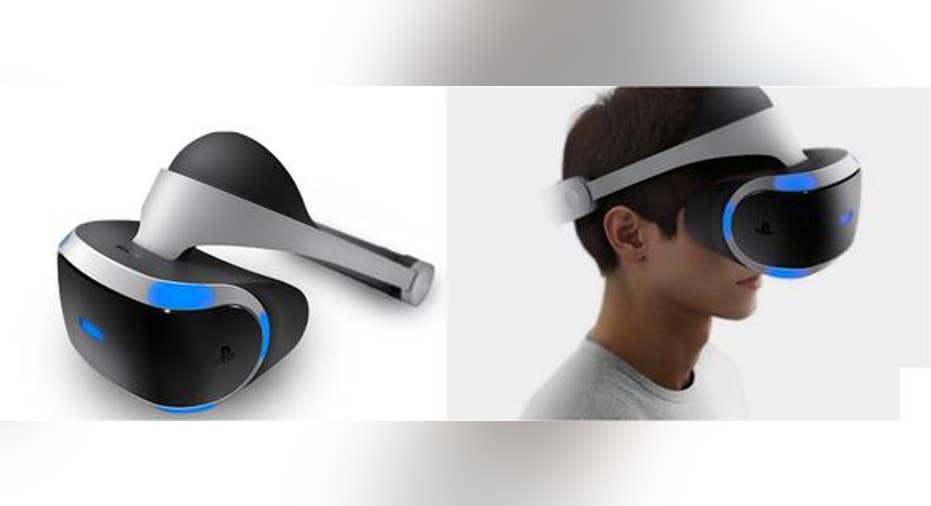Facebook Inc. vs. Sony Corporation: Who Will Win the VR Market in 2016?

The virtual reality market, which currently includes smartphone-centered devices like Alphabet 's Google Cardboard and Samsung 's Gear VR, isn't worth much today. However, tech M&A advisory firm Digi-Capital expects that market to be worth $30 billion by 2020, fueled by rising interest in VR games and experiences.
2016 is expected to be a pivotal year for the industry as two major headsets, Sony's PlayStation VR and Facebook's Oculus Rift, finally launch commercially. Which one of these headsets will reach more mainstream consumers and shape the future of virtual reality?
Sony's strategySony's PlayStation VR, which is powered by the PS4, will have a 5.7" 1080 OLED display, a 100-degree field of view, and a 120Hz refresh rate. A DualShock 4 gamepad can be used for many games, the PlayStation Move wand controller can be used to simulate "hands" in a virtual environment, and the PlayStation Camera will track a user's body movements.
Source: Sony.
The platform's launch titles will include the rhythm-based shooter REZ Infinite, the racing game DriveClub, and the multiplayer shooter EVE: Valkyrie. Sony hasn't set an official price for the headset yet, but Sony Computer Entertainment CEO Andrew House stated that it would "be priced as a new gaming platform" during the Tokyo Game Show. This likely means that the device will cost $300 to $400.
Facebook's strategyFacebook's Oculus Rift will be compatible with higher-end "Oculus ready" PCs. These systems cost at least $800, which is substantially higher than the PS4's price tag of $350. The Rift is expected to cost more than $350, which gives it a higher combined price tag than the PS4 and the PlayStation VR.
Source: Oculus VR.
Like the PlayStation VR, the Rift will likely sport a 5.7" screen, but it will have a slightly higher resolution and a wider 110-degree field of view. However, the Rift is expected to have a lower maximum refresh rate of 90Hz. A high-resolution, wide field of view, and a high refresh rate are all required to reduce the latency which can cause motion sickness while wearing VR headsets. Oculus games can be controlled with an Xbox One controller or its own Oculus Touch controller, which simulates hand movements.
Confirmed launch titles for the Rift include Job Simulator, which lets a player virtually perform a variety of jobs, the real-time strategy game Moon Strike, and Harmonix's Rock Band. A large number of existing PC games are also being modified with Rift support. Facebook will also likely release more VR films for its headsets through the Oculus Story Studio.
The number of potential gamersSony's PlayStation VR is ultimately limited by the number of PS4 gamers. To date, over 30 million PS4 consoles have been sold. If PS4 sales eventually rise to PS3 levels, the PlayStation VR could potentially reach over 86 million consoles. That's a pretty big market, but it's likely that only hardcore gamers will pay up to $400 for a VR headset.
Facebook's Oculus Rift could reach a much wider audience of PC gamers. Various market estimates place the global PC gaming population at700 million to 800 million. Last year, research firm NPD Group estimated that about 20% of those gamers (140 million to 160 million people) are considered "heavy core" gamers. Those numbers indicate that Facebook could easily sell more VR headsets than Sony.
While it's easy to consider the PlayStation VR and the Oculus Rift to be rivals, there might be enough room for both headsets to thrive. The two devices are designed for non-overlapping markets with a similar goal in mind -- to boost mainstream awareness for VR games and experiences. Meanwhile, companies like Alphabet and Samsung are focusing on turning smartphones into lower-cost VR headsets.
Samsung and Oculus' Gear VR. Source: Samsung.
So which company will pull ahead?As long as all these devices generate interest in VR experiences across consoles, PCs, and mobile devices, their manufacturers could reap the rewards of higher hardware sales and ecosystem growth. But if we look at long-term growth, Facebook could eventually pull ahead by integrating VR experiences into its social network of 1.55 billion monthly activeusers.
Facebook CEO Mark Zuckerberg already hinted at this future, stating that Oculus would start with "immersive gaming" but eventually expand into "a platform for many other experiences" like remote teaching or attending live events. Facebook is already offering glimpses of that future with 360-degree videos, and Oculus could eventually become a tool for visiting friends in virtual reality environments. Therefore, Sony might be introducing a cool new gaming peripheral, but Facebook could be ushering in a new age of digital communication.
The article Facebook Inc. vs. Sony Corporation: Who Will Win the VR Market in 2016? originally appeared on Fool.com.
Leo Sun has no position in any stocks mentioned. The Motley Fool owns shares of and recommends Alphabet (A and C shares), and Facebook. Try any of our Foolish newsletter services free for 30 days. We Fools may not all hold the same opinions, but we all believe that considering a diverse range of insights makes us better investors. The Motley Fool has a disclosure policy.
Copyright 1995 - 2015 The Motley Fool, LLC. All rights reserved. The Motley Fool has a disclosure policy.



















